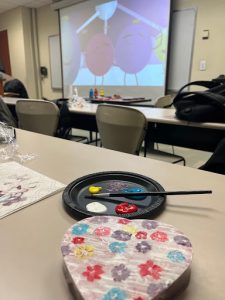The Gender and Sexuality Alliance (GSA) recently held an Anti-Valentine’s Day event Thursday, Feb. 15.
The afternoon was open to all Wilkes faculty, staff and students and was filled with a mixture of informational learning and crafting where informational videos were played that discussed aromantic and asexual orientations while students painted.
Morgan Steiner, president of GSA and a junior majoring in political science, international relations and history, hosted the event to educate students and come together to have some fun after Valentine’s Day.
“I like doing some of our events on a smaller scale, especially because the majority of our events are larger,” said Steiner. “This one is more intimate where we will learn more while having fun and enjoying some painting.”
Ozzie Priebe, a freshman political science major, attended the event and shared that this was very important when it came to teaching those outside the community what the identities are.
“I think it teaches people outside of the community what aromantics and other identities are that way others can have a better understanding,” said Priebe.
The informational videos shown were meant to inform those who did not already know what aromatic or asexual orientations were and how they can differ from others. Aromantic orientations feel little to no romantic affection and asexual orientations feel little or no sexual attraction.
Dr. Helen Davis, English and women and gender studies professor and advisor for GSA, thought this was a great event to hold especially with it being the day after Valentine’s Day.

“The educational component to this event is so important because these identities are often not understood and by educating students about what they are, it will help us all to better understand,” said Davis. “It is nice to be able to get together and do this event the day after.”
Davis mentioned that this holiday comes with a lot of pressure associated with it, especially to form romantic relationships, and it is important for students to understand and learn that there are different identities other than the traditional romantic ones.